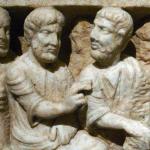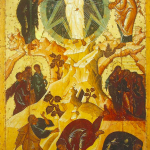[UPDATE: A year later, on the way to LA RE/Congress 2015, I’m still asking these questions. You don’t need to comment with last year’s arguments, many of which were convincing, once y’all realized I wasn’t serious about wiping children’s catechesis off the map. But I will be in Anaheim this year looking for signs that lifelong catechesis of adults is A Thing deserving of even half the energy we put into supplying training, resources, and networking support for making kids Catholic. I will share what I find.]
You know that 40 Years of Bad Catechesis you’ve all been scapegoating for everything that ails the Church? That Babylonian Captivity of Sound Doctrine, that Wandering in the Wilderness of the Butterfly Banner for which I’ve been saying a grudging mea culpa ever since my reversion? Well, you’re partly right. And partly really, really wrong.
Bad Catechesis has been an integral part of our tradition for a lot longer than 40 years, and it still goes on. Our seeming inability to form Catholics who understand and embrace the basics of the Faith is not the fault of Vatican II or goofy textbook publishers or ill-equipped religious ed volunteers. It’s not even the fault of the Baltimore Catechism or nuns with rulers or homeschooling, although these are just as valid examples of Bad Catechesis.
This morning, sharing a friend’s dismay about yet one more over-promoted but under-attended parish workshop for adults, it hit me. Our catechesis fails not because of our methods or our teachers or our educational philosophy, but because we have been—for as many decades as I can remember in my own life, and long prior to that in ancestral memory—catechizing the wrong damn people.
Our whole formational structure is and has ever been concentrated on children. What formation opportunities most adults—that is, Catholics not engaged in regular liturgical or catechetical or outreach ministries–encounter in the average parish consist of extensions of the parenting of children: sacramental preparation for Marriage, Baptism, First Confession and First Communion, Confirmation, and the occasional intergenerational catechetical activity. There may be adult workshops and classes on a variety of topics related to family life, but they’re rarely attended by those not already in the ministerial loop.
For adults who aren’t parents or parish ministers, there are various sodalities and prayer groups that draw people of similar devotional tastes. There are Bible studies and—Deo gratias—packaged programs like Fr Barron’s terrific Catholicism and the EPIC Church History series (Church history being a big draw, though by no means all there is to adult formation). But even these are options, competing with a million other parish and school and work and life commitments. Once completed, there’s rarely followup or guidance in integrating the “content” of the “class” into the ongoing formation and spiritual growth of the attendees.
And then there’s, well, the homily. We know from the data that for most adult Catholics who attend Mass (and this is, sadly, by no means the majority of adult Catholics) the homily and whatever’s in the bulletin constitute the full extent of their religious formation.
Dear God, no wonder.
The thing is, whatever method you use, from Latin recitation to puppet play, there is no way you can transmit adult faith to a child of 5 or 7 or 11 or 13 or (if you’re really, really lucky) 17. There is even less possibility of success when you expect the child to retain that barely-comprehensible catechesis into adulthood and assume the challenge of becoming not only a lifelong autodidact of the Faith, but also an intentional disciple and catechist of his or her own children.
Other denominations, I’ve observed, do a better job of offering meaningful adult faith formation, and it’s well attended. Yes, there is Sunday school for children, but that’s not considered the central formational focus of the community. There are logistical differences beyond the confessional ones here, of course. Episcopalians and Lutherans and Presbyterians rarely offer 6 back-to-back services on a Sunday morning, and don’t have the same need for childhood sacramental preparation as Catholics do. Many Protestant churches schedule formation opportunities for all ages on Wednesday evenings.
That’s part of the reason the adult formation classes and workshops we do offer are so poorly attended—adult catechesis just not a part of our regular expectation and structure. And adding it to an already overscheduled parish calendar doesn’t seem to be much of a solution.
So here’s my totally immodest proposal, audaciously presented on the virtual eve of the grand ComicCon of Catholic religious education, L.A.’s RECongress: Snap out of it. Let’s just stop catechizing children.
Let’s take the whole Titanic of faith formation–the mechanism of decades, the time and money and energy we spend on textbooks and videos and computer programs and crafts and puppets and afterschool programs and catechist certification and convention receptions with Irish dancers and an open bar—and turn it around so it focuses on supporting adults in their faith formation. Let’s stop expecting 7-year-olds to teach their parents that the Real Presence is not some cannibalistic mumbo-jumbo, or that there’s more to the grace-filled witness of Matrimony than the fact that gay high school teachers get fired over it.
Let’s stop sneering at adults who do Veddy Veddy Improper Things at Mass, and invite them into the splendors of liturgy. Let’s stop expecting Deacon or Father to deliver complex moral theology that’s both impeccably orthodox and eminently practical in under 10 minutes on Super Bowl Sunday, and make support for living authentic adult Catholic lives a part of everything we do. Let’s look at sacramental preparation (for all sacraments) as a parish family affair, in which adult Catholics form and prepare younger Catholics. Let’s make the faith formation of adults a priority, and believe me, their children will benefit.
Some of this is already being done, and done well. But as long as it’s an add-on, an extra, something that’s not seen as fundamentally important both by the institution and the people who engage in it, we’ll just keep going along as we have been, trying to do the impossible and looking for something to blame when we fail.
That’s why I say let’s make it a dramatic break. What if, starting next fall, there were no children’s religious education programs? What if our Catholic schools stopped teaching religion as a subject below the high school level, and instead focused on imbuing academic subjects with Catholic sensibilities? What if, on the other hand, we expected all adults to participate in some form of faith formation on a weekly basis, and provided child care to make it easier? (Thrifty re-use of craft supplies, that.) What if our catechetical conventions and publishers and media producers and speakers’ bureaus focused exclusively on adult faith formation?
Heads would explode, for sure. We’d experience a disturbance in the Force—as though the whole catechetical-industrial complex had cried out in terror and were suddenly silenced. (If this takes off, they can blame me for 40 Years of Good Catechesis. Mea culpa in advance.) But a Gibbs-slap to the back of the head might be just what we need. It actually supports the New Evangelization, because that’s what we would be doing—evangelizing. Catechesis follows evangelization, and it has just never worked to catechize children and expect them to evangelize their parents.followup
Let the little children be children. Let the adults come unto Him, and do not hinder them!
Attribution: Photo by the author.
___
UPDATE 2/5/14: There are some great discussions going on here in the comments, on social media, and around the blogosphere! Thank you for the passion you bring to this! Please read my followup post from yesterday, which contains links to pieces by other bloggers suggesting why adult- or family-centered catechesis/formation is the way to go. And if you hear of well-thought-out arguments for continuing the present focus on children (not just because, by default, they’re the only ones we can corral), please comment with a link! Thanks!
MORE UPDATE: Jen Fitz, on the role of parents.















